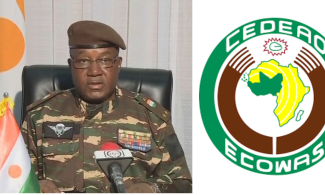ECOWAS split erodes Nigeria’s clout, threatens strategic goals – ICG
The recent withdrawal of Burkina Faso, Mali and Niger from the Economic Community of West African States (ECOWAS) diminishes Nigeria’s influence in the region and could undermine its longer-term strategic interests, the International Crisis Group has warned. In a new report, titled “What Turmoil in ECOWAS Means for Nigeria and Regional Stability”, ICG says the […]

The recent withdrawal of Burkina Faso, Mali and Niger from the Economic Community of West African States (ECOWAS) diminishes Nigeria’s influence in the region and could undermine its longer-term strategic interests, the International Crisis Group has warned.
In a new report, titled “What Turmoil in ECOWAS Means for Nigeria and Regional Stability”, ICG says the nations’ exit has special implications for Nigeria, being the region’s dominant country with half of its population and 67 per cent of its gross domestic product.
Crisis Group observes that the crisis in ECOWAS “is, at least in part, a reflection of Nigeria’s diminished influence in West Africa”, a process that started over a decade ago, but was “significantly aggravated during the eight years of Muhammadu Buhari’s lethargic presidency”.
The Brussels-based conflict prevention and peacebuilding organization says the pull-out of Burkina Faso, Mali and Niger is a major disappointment for Nigeria, especially happening while the country’s president, Bola Tinubu, was the rotational chairman of the bloc.
- Broken ECOWAS imperils West Africa, requires redoubled efforts – ICG
- West African rural areas have access to 10% electricity – ECOWAS
The division in ECOWAS, according to the ICG report published on its website on March 29, is a setback for Nigeria on several counts, as it undermines its heavy investment, spanning nearly five decades, in the region’s economic integration, political development and security.
“Along with Togo, Nigeria was the driving force behind the bloc’s 1975 founding…provides more than 50 per cent of the funding for the ECOWAS Commission. It has also been the lead contributor to peacekeeping operations and hosts, in Abuja, three of the organisation’s key institutions, namely the Commission headquarters, the ECOWAS Parliament and the ECOWAS Community Court of Justice,” the report notes.
Beyond the loss of political, economic and security investments, Crisis Group predicts that the split could also exacerbate Nigeria’s security challenges and warns that the breakdown of regional security cooperation could worsen insecurity in Nigeria, especially in the northern states.
ICG says the countries’ exit has shrunk “Nigeria’s immediate sphere of influence”, thereby diminishing its leverage to foster regional security and peace. It adds that with the breakaway nations now forging stronger military ties with Moscow, Nigeria “may have to contend with neighbours aligned more with Russia’s geopolitical project of countering Western influence than with West Africa’s goals as identified by ECOWAS, such as promoting regionwide development, democracy and peace”.
The report says the split further poses longer term challenges to Nigeria’s strategic interests and highlights that “the loss of clout in the region could erode the support that Nigeria needs in its quest for permanent membership of a reformed UN Security Council”.
Crisis Group urges the Nigerian government and the ECOWAS Commission to “redouble diplomatic efforts” towards fresh talks with the junta leaders, employing credible third-parties such as respected religious, traditional and women leaders, as well as members of the ECOWAS Committee of the Wise.
ICG charges ECOWAS to address the breakaway nations’ grievances, review its programs and activities, and reassure all members that it remains focused on its original mandate. It also urges the bloc to assist them in fighting insurgencies, demand equitable relations between France and aggrieved Francophone states, and dispel the impression, held by some citizens, that the body is being teleguided by Western powers.
Crisis Group also called on Burkina Faso, Mali and Niger to rethink their current hardline stance and seize the olive branches ECOWAS is offering them, “for the sake of regional comity and security and out of respect for their own citizens’ civil and political rights”.
ICG advises that if all reconciliation efforts fail, ECOWAS should seek an agreement with the breakaway countries, “for calibrated disengagement from the bloc and, subsequently, peaceful cohabitation”. Such an agreement, it adds, should “clarify the status of citizens of the two blocs, in terms of their rights to movement, work and residence in the other bloc” and also prohibit any mass expulsions.
